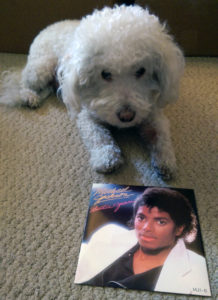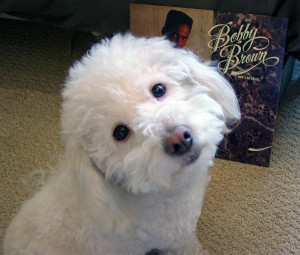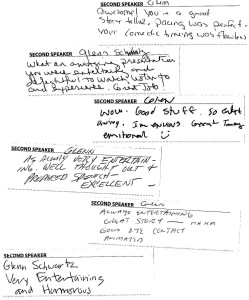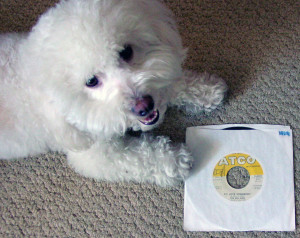Duets. Twenty of ’em.
Happy Valentine’s Day!
Click here to like Tunes du Jour on Facebook!
Follow me on Twitter: @tunesdujour
Follow me on Instagram: @glennschwartz
Duets. Twenty of ’em.
Happy Valentine’s Day!
Click here to like Tunes du Jour on Facebook!
Follow me on Twitter: @tunesdujour
Follow me on Instagram: @glennschwartz

MTV debuted on August 1, 1981. Back then it was a music video network. It positioned itself as a rock station. Most of the videos shown were of songs made by Caucasian performers, though rock-leaning black acts such as Joan Armatrading and the Bus Boys got some play.
Then came “Billie Jean.” The second single from Michael Jackson’s Thriller, “Billie Jean” was accompanied by a stylish video featuring a mesmerizing performance from Jackson. However, it wasn’t a rock song. It didn’t fit the format of rock radio stations, and it didn’t fit the format of MTV either.
But there is a big difference between radio and music television. There were plenty of radio stations and many different formats. You may not hear “Billie Jean” on the rock stations, but you could hear it on r&b stations and pop stations and dance-leaning stations. However, there was only one music television – MTV.
In his autobiography, Howling at the Moon, Walter Yetnikoff, head of CBS Records, for whom Jackson recorded (and where I worked in my first music business job), wrote “I screamed bloody murder when MTV refused to air [Jackson’s] videos. They argued that their format, white rock, excluded Michael’s music. I argued they were racist assholes – and I’d trumpet it to the world if they didn’t relent. I’ve never been more forceful or obnoxious. I’ve also never been as effective, threatening to pull all our videos. With added pressure from [Thriller producer] Quincy Jones, they caved in, and in doing so the MTV color line came crashing down.”
Jackson’s video for “Billie Jean” aired on MTV, followed just weeks later by his video for “Beat It,” a song whose guitar solo from Eddie Van Halen helped make it a hit on rock radio. These two videos made Jackson, already a superstar, a worldwide phenomenon with a humongous fan base that transcended race, age and location in a way never seen before. These two videos made MTV, a year and a half old and fairly popular in white suburban areas, a cultural institution. These two videos made the music video, then not something done for many singles, particularly those performed by artists of color, an art form and a necessary marketing tool.
Some people tuned in to MTV to see the Michael Jackson videos, and while watching the channel, discovered other acts. Some people tuned in to MTV to watch “white rock” videos, and while watching the channel, discovered Michael Jackson.
MTV went to showcase more “non-rock” videos. In 1988, they launched their hugely popular program Yo! MTV Raps, something that would have been completely unexpected just five years earlier, pre-“Billie Jean.”
While MTV deserves credit for making “Billie Jean” and Thriller successful, the person most responsible is Jackson himself. He wrote the song. He sang the song. He danced the song. Quincy Jones did not want “Billie Jean” to appear on Thriller. He didn’t like the title. He didn’t like the bassline. He felt the song’s introduction was too long. Jackson argued “But that’s the jelly!…That’s what makes me want to dance.” Jones wasn’t ready for this jelly, but Jackson stood his ground.
In May of 1983, NBC aired a tribute to Motown Records. Motown: Yesterday, Today, Forever featuring many legends who recorded for the storied label performing their classics. We saw Diana Ross, the Temptations, Marvin Gaye, Smokey Robinson and the Miracles, Stevie Wonder, the Four Tops, Martha Reeves, Lionel Richie and the Commodores, Mary Wells, Junior Walker and then some. It was a terrific show, but the talk of the town following its airing was the performance of a song not from the Motown catalogue – Michael Jackson’s “Billie Jean.” The iconic performance, during which Jackson brought the famous moonwalk to the world at large, pushed him that much more ahead of any other performer working in music back then.
Following “Beat It,” CBS Records released four more singles from Thriller. All seven of the singles released (the album had only nine songs!) went top ten, breaking the record of most top ten hits from a single-artist album that was set a few years earlier by…Michael Jackson, whose Off the Wall gave us four. Before Thriller, four singles for one album was considered a lot. Thriller raised the bar for blockbuster albums, and subsequent releases such as Bruce Springsteen’s Born in the U.S.A., Prince’s Purple Rain, Def Leppard’s Hysteria and Janet Jackson’s Control each produced more than four hits.
“Billie Jean” changed everything.
On this week’s Throwback Thursday playlist, Tunes du Jour spotlights 1983, kicking off with Michael Jackson’s classic “Billie Jean.”
Click here to like Tunes du Jour on Facebook!
Follow me on Twitter: @TunesDuJour

Today is Bobby Brown’s 46th birthday. A former member of New Edition, Brown had his first solo hit in 1988 with “Don’t Be Cruel,” which reached #8 on the Hot 100. Though it shares its title with an Elvis Presley #1 hit from 1956, Brown’s “Don’t Be Cruel” is not a remake.
That brings us to today’s playlist, which I call The Song Retains the Name. It consists of different songs with the same title. I initially planned to include twenty such songs, but more kept springing to mind. Before I knew it, I passed 100 entries. There are plenty more, so I decided to open this up to my reader(s). If you have songs that share titles you’d like to add, feel free to do so.
(NOTES: I included The Jacksons’ “This Place Hotel” because when it was released in 1980 its title was “Heartbreak Hotel.” Thought he didn’t have to, Michael Jackson, the song’s writer, later changed its name to “This Place Hotel” to avoid confusion with the Elvis Presley song “Heartbreak Hotel.” Whitney Houston didn’t feel the need to make the same Hotel accommodation.
Also, though it is listed on Spotify as “The Best of My Love,” the Eagles track does not have a “The” on the 45 or the band’s On the Border album.)
Click here to follow Tunes du Jour on Facebook!
Follow me on Twitter: @TunesDuJour

Last night I spoke about my journey to improved self-confidence. As you can see from the above comments, it was well-received.
I love speaking. I love sharing my stories and messages with an audience. I love to inspire people to pursue their dreams and to better enjoy their lives. I can usually sense when a speech is really connecting with the audience. It’s a great feeling, like hitting a home run.
I’ve never actually hit a home run playing baseball, but I used that phrase to segue into today’s playlist. The World Series begins tonight, I think. I don’t know who’s playing, but it’s a good excuse to collect baseball songs. Here are twenty fun ones.
Click here to like Tunes du Jour on Facebook!

Ten facts about Barry Gibb:
• As a member of the Bee Gees and as a producer and writer, Barry contributed to more than half of the songs on the soundtrack to the film Saturday Night Fever. That album went on to sell 40 million copies and was the all-time best-selling album until it was outsold by Michael Jackson’s Thriller.
• The Bee Gees are the only group to have six consecutive singles go to #1, all of which were also written and produced by them – “How Deep is Your Love,” “Stayin’ Alive,” “Night Fever,” “Too Much Heaven,” “Tragedy” and “Love You Inside Out.”
• For twenty-seven of the thirty-seven weeks from December 24, 1977 through September 2, 1978, the #1 singles in the US featured Barry Gibb as a writer. The songs were the Bee Gees’ “How Deep Is Your Love,” “Stayin’ Alive” and “Night Fever,” Andy Gibb’s “(Love Is) Thicker Than Water” and “Shadow Dancing,” Yvonne Elliman’s “If I Can’t Have You” and Frankie Valli’s “Grease.”
• Barry Gibb wrote “Grease” without his brothers. It was Frankie Valli’s only #1 single not co-written by Bob Gaudio or Bob Crewe. At the time Gibb approached Valli about recording the tune, Valli didn’t have a record deal. It was Valli’s last top 40 single.
• For three weeks beginning March 18, 1978, Barry was the lead singer, co-producer or co-writer of four of the US’ top five singles – “Night Fever,” “Stayin’ Alive,” “(Love Is) Thicker Than Water” and Samantha Sang’s “Emotion.”
• Barry and Robin Gibb wrote “Emotion” for the film Saturday Night Fever. It wasn’t used in the pic; however, it was used in the Joan Collins film The Stud the following year.
• Gibb was a co-producer and co-writer of the Kenny Rogers/Dolly Parton duet “Islands in the Stream.” The record was a #1 country and pop hit, the last song to top both of those charts for 17 years. Barry Gibb said the song was written for Marvin Gaye to record.
• Dionne Warwick did not care for “Heartbreaker,” written by the Bee Gees, but she recorded it anyway, as she trusted the brothers’ judgment that it would be a hit. It sailed into the top ten in 1983, her first single to do so in four years.
• The Bee Gees-penned “Chain Reaction” was one of two #1 solo singles for Diana Ross in the UK, the other being “I’m Still Waiting.” Neither are amongst her 27 post-Supremes top 40 hits in the US.
• As a songwriter Gibb has had No. 1 songs in the 1960s, 1970s, 1980s, 1990s and 2000s.
Today Barry Gibb turns 68. Here are twenty songs he sang and/or wrote and/or produced.
Click here to like Tunes du Jour on Facebook!

As you may gather from my blog, there’s a lot of great music I love. There is also a lot of bad music I love. I find the combination of dopey lyrics with catchy music irresistible.
That brings us to Sheena Easton, who turns 55 today.
Her first hit single was “Morning Train.” In England it was entitled “Nine to Five,” but they changed the title stateside so as to avoid confusion with Dolly Parton’s hit “9 to 5.” Easton’s Scottish brogue could very easily be confused with Dolly’s Tennessee twang by the hearing-imparied.
The chorus of “Morning Train,” a #1 hit from 1981, begins “My baby takes the morning train / He works from nine to five / And then he takes another home.” Fascinating, Sheena! Tell us more! I’ve never heard such a unique story.
Her follow-up single was “Modern Girl,” which includes the couplet “She eats a tangerine / Flips through a magazine,” a rhyme that was used to better effect 14 years later in The Flaming Lips’ “She Don’t Use Jelly.”
The James Bond theme “For Your Eyes Only” came next. I have no beef with that. It’s on her fourth single where the bad reaches a new level.
You know you’re in trouble with “You Could Have Been With Me”’s opening line. “You’re the seventh son of the seventh son.” Who can’t relate to that? Later in the song she sings “You can’t even seem to love yourself, and, with a few exceptions, not anybody else.” With a few exceptions? That negates the point, doesn’t it? He doesn’t love you, Sheena! Get over it! He can’t appreciate the magazine/tangerine rhyme like I can.
Knowing she couldn’t get any worse than “You Could Have Been With Me” (she did know that, right?), she went on to do a series of fun, uptempo hits. This was after an excruciating cover of Bob Seger’s “We’ve Got Tonight” done with Kenny Rogers. I didn’t include that on today’s playlist. Don’t say I don’t care about you.
The pinnacle of the fun dance songs was when she invited the listener to “come spend the night inside my sugar walls.” Sweet! “Sugar Walls” was written by Prince under the pseudonym Alexander Nevermind. She would collaborate with Prince a few more times, most notably on his hit “U Got the Look.”
Spotify is very light on the Sheena Easton tracks; they don’t even have her last big hit, “The Lover in Me,” which went to #2 in 1989. Here’s what I scraped together. Strut, pout, put it out and enjoy!
In 1967 country music superstar Porter Wagoner invited Dolly Parton to co-host his TV series. The duo went on to record twelve albums together. The television exposure helped Dolly score several solo hits as well, including the classic “Jolene.”
She left the series in 1974 to focus on her solo career. As a goodbye and thank you to Wagoner she wrote and recorded “I Will Always Love You.” The record went to #1 on the country music chart but it didn’t crossover to the pop charts.
After he heard Parton’s record, Elvis Presley wanted to record a cover of the tune. Dolly was open to this until Presley’s manager told her she would have to turn over half of the publishing royalties to Elvis in exchange for him making the song a hit. She declined.
In 1975 Linda Ronstadt recorded a cover of the tune for her Prisoner in Disguise album.
In 1982 Parton re-recorded the song for her film The Best Little Whorehouse in Texas. The new version also went to #1 on the country chart. It reached #53 on the pop chart.
Ten years later Whitney Houston recorded her version of the song for the soundtrack to her film The Bodyguard. The plan was for Houston to cover “What Becomes of the Brokenhearted,” but that song ended up being used in another film released in 1991. Kevin Costner, Houston’s co-star in The Bodyguard, was familiar with “I Will Always Love You” from Linda Ronstadt’s recording of it. He suggested it to Whitney, who loved it. Clive Davis, the head of Whitney’s label, Arista Records, wasn’t sure about having his soul diva cover a country song, but Costner insisted. You know how this story ends.
Today Tunes du Jour celebrates the 68th birthday of Dolly Parton by laughin’ and drinkin’ and havin’ a party and presenting a playlist of some of her best.